Recent Water Damage Posts
What To Do When You Have Water Damage
5/6/2024 (Permalink)
Water damage can wreak havoc on your home or property. Water damage can occur from burst pipes, leaking roofs, storms, floods, and hurricanes. The consequences can be devastating, leading to structural damage, mold growth, and potential health hazards.
When facing these situations, it is best to contact a restoration company such as SERVPRO®. However, here are some simple actions you can take while you wait on a SERVPRO team to arrive at your home.
Turn off the Power
Attempt to safely switch off the electricity and gas to avoid electrocution and gas leaks. If unable to do so due to an extensive amount of water in the home, wait for a SERVPRO team to arrive and cut the power off.
Locate and Stop the Water Source
Identify where the water is coming from. If it is coming from a burst pipe or leaking appliance, turn off the water supply to prevent further flooding.
If the source of the water is external, such as a storm or flooding, do your best to divert or contain the water from further damaging your home and furniture.
Remove Excess Water
Use pumps, wet/dry vacuums, buckets, or towels to remove as much water as possible from the affected area. The faster you can extract the water, the better chance you have of preventing further damage and mold growth.
Move Belongings Out of Water
To prevent further damage to your furniture, move them to another room that is dry. If you have heavy furniture that you are unable to lift and move around, wait for a SERVPRO team to arrive to assist with moving the furniture.
SERVPRO also specializes in restoring any piece of furniture that has been damaged during the disaster.
Call your Insurance Company
Once you have done all the above, now is the time to contact your insurance company and investigate what is covered in terms of water damage. Document the damage thoroughly and file a claim with your insurance as soon as possible in order for you to get reimbursed for the costs of mitigation.
Dealing with water damage is a long and stressful process. Luckily, SERVPRO is available 24/7 with a team of certified professionals who are equipped with advanced equipment to resolve disasters like these.
SERVPRO, the only restoration company that makes “Like it never even happened” happen.
The Unseen Enemy: Uncovering Hidden Water Damage With Moisture Inspections
5/25/2023 (Permalink)
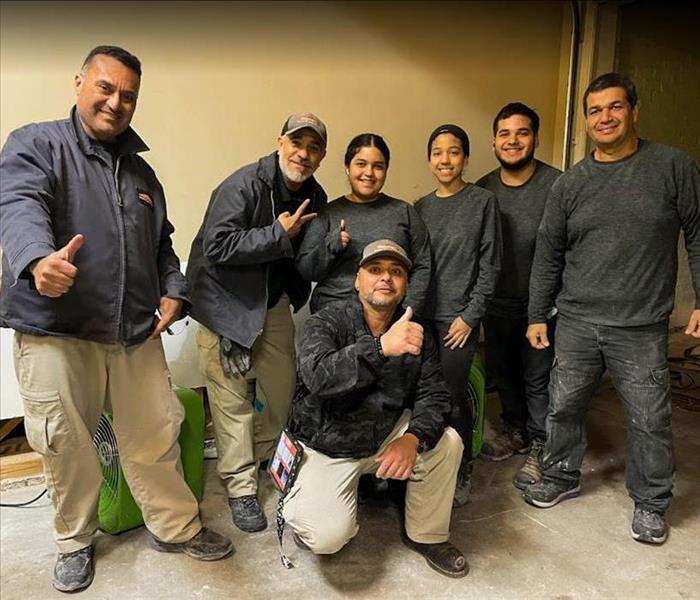 Our SERVPRO water damage restoration technicians are here to help 24/7/365 to help you with your emergency needs. Call today for rapid service!
Our SERVPRO water damage restoration technicians are here to help 24/7/365 to help you with your emergency needs. Call today for rapid service!
When it comes to moisture inspections here in Acworth, many people don't even realize what they're missing. The unseen enemy of water damage can be lurking beneath the surface in any home or business, and only a thorough inspection will reveal its presence. As an expert team in moisture inspections, we’re here to tell you that this hidden menace shouldn't be ignored - if you want to protect your property from costly repairs down the line, uncovering any water issues now is crucial. Moisture inspections are a crucial part of preventing costly water damage repairs and mold.
The signs of water damage aren't always obvious; without proper monitoring equipment, most homeowners won't know there's a problem until water damage restoration is necessary. That is why home maintenance is the ideal first defense.
No matter how big or small your property may be, it pays to keep an eye out for possible signs of water damage. By understanding what needs to be looked for during a moisture inspection and taking proactive steps towards preventing future problems, you'll have peace of mind knowing that your space is safe and secure - all with just one inspection!
What Is A Moisture Inspection And Why Is It Crucial?
A moisture inspection is a comprehensive assessment of the condition and health of any given space. It allows us to detect hidden water damage that can be difficult for the naked eye to see, such as mold or rot. Moisture inspections are important because they provide an accurate picture of what's happening inside the walls and floors. This gives you peace of mind knowing that your home or business is safe and free from potential problems down the line.
What makes moisture inspections so effective is their ability to detect invisible signs that something isn't right - especially when it comes to water-related issues. With advanced technology like infrared cameras and moisture meters, we're able to spot even the most subtle changes in humidity levels before major damage occurs. By pinpointing these issues quickly, we can help prevent further destruction from occurring by taking corrective action sooner rather than later. Knowing this information helps protect not only your property but also those who live or work in it. Now let’s look at how this technology works to uncover the unseen enemy: detecting the invisible with moisture inspections.
Detecting The Invisible: The Technology Behind Moisture Inspections
Moisture inspections are critical to uncovering hidden water damage in any home. To detect the unseen enemy, moisture inspectors like our SERVPRO of Northwest Cobb County team use a variety of technologies that allow them to identify areas of potential concern. These tools include infrared cameras, thermal imaging devices, and hygrometers which measure relative humidity levels.
Infrared cameras can be used to visually inspect walls for temperature differences. If there is an area where temperatures are different from others, it could indicate that moisture has been retained within the wall- or ceiling cavity due to inadequate ventilation, blocked drainage lines, plumbing leaks or other causes. Thermal imaging also identifies hot or cold spots where wet insulation or damp wood framing are present. Hygrometers provide quantitative data on the percentage of moisture present in a particular area allowing us to determine if further investigation is necessary. With these powerful tools at our disposal, we can quickly locate and diagnose sources of hidden moisture and recommend solutions before serious damage occurs.
Common Areas For Hidden Moisture In Your Home
Understanding where to look for hidden water damage is a crucial part of conducting any moisture inspection. Common locations include behind walls, ceilings, cabinets and floors. Moisture can also be found in areas that are difficult to inspect such as attics or crawl spaces. Here are some common areas to look out for during a moisture inspection:
Roofs and Attic Spaces: Look for signs of leaks around the roofline and check ventilation systems for proper functioning.
Walls and Ceilings: Check any cracks or gaps between wallboard/drywall joints or other building materials. Also inspect window frames and door frames for condensation buildup.
Plumbing Fixtures: Inspect around sinks, tubs, showers, toilets and pipes for signs of moisture build up or leaking water.
Basements & Crawl Spaces: Inspect these areas carefully since they are prone to high humidity levels due to their proximity to the ground level.
Flooring: Whether carpet, laminate, or wood, flooring can experience moisture build up causing discoloration, warping, and even harboring mold.
Windows: Because window sealant and window systems can deteriorate over time, sometimes moisture will build up from rain or water sprinklers nearby creating an environment for mold.
Knowing what to look for when inspecting various parts of your home will help you identify potential sources of hidden water damage before it becomes an issue. By understanding the link between hidden water damage and mold growth, homeowners can take proactive measures to prevent costly repairs down the road.
Getting Professional Help: Choosing A Certified Water Damage Restoration Company
When it comes to uncovering hidden water damage and dealing with moisture inspection results, it's important to enlist the help of a professional. Certified restoration companies like ours, are trained in the latest techniques for assessing and mitigating water damage, ensuring that not only is your property restored quickly but also safely.
The first step when selecting a certified company is making sure they are reputable by checking their qualifications, certifications, references, and insurance coverage. It's also important to find out what services they offer; many companies specialize in specific areas such as mold remediation or structural drying. Additionally, make sure you understand how long the process will take from start to finish, so you can plan accordingly. Taking these steps will ensure that you get the best possible outcome from your moisture inspection experience.
Finding a qualified professional does require some research on your part, but it pays off in the end by providing peace of mind knowing that your home or business has been properly repaired and protected against future water-related issues.
Conclusion
The unseen enemy of water damage can be devastating to your home or business. That's why it is so important to get a moisture inspection as soon as possible if you think water damage may be present. With the proper technology, our certified professionals serving Cobb County can detect hidden water damage before it leads to costly repairs or dangerous mold growth.
At our company, we understand the importance of preventing further destruction from happening in your home. We use advanced tools for inspecting any signs of potential water problems that may exist on your property. Our team of certified experts are highly experienced with finding even the most minuscule amounts of moisture in hard-to-reach areas.
Whether you're dealing with visible or invisible water damage, getting a professional moisture inspection done is an essential step toward safeguarding your home and family from long-term issues due to water damage. Don't wait until it's too late - contact us today!
6 Simple Maintenance Tips to Keep Your Home Safe From Water Damage | SERVPRO® of Northwest Cobb County
3/22/2022 (Permalink)
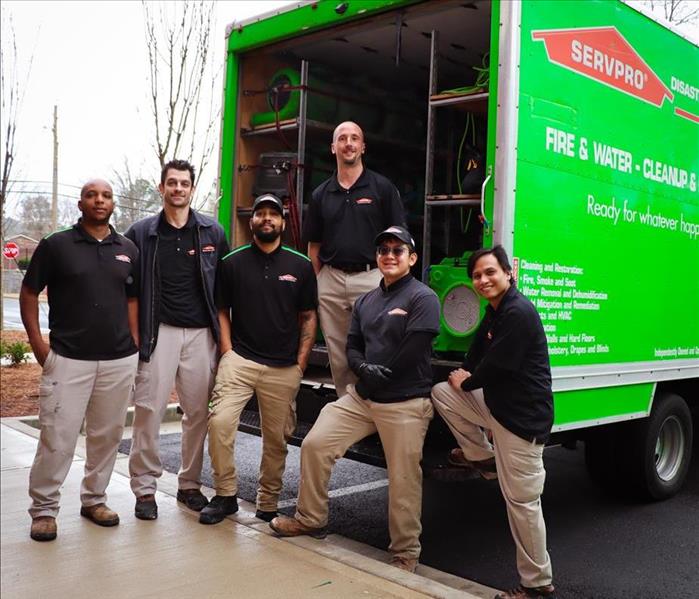 Our trained SERVPRO technicians are ready to support you immediately with all of your water damage restoration needs. Call us today!
Our trained SERVPRO technicians are ready to support you immediately with all of your water damage restoration needs. Call us today!
Water damage is expensive and inconvenient. SERVPRO of Northwest Cobb County, your local water damage expert, has seen this happen many times. If you take care of your property, it will help to prevent water damage and also minimize the cost. If your property floods, it's natural to feel stressed. However, you can help prevent damage and avoid the stress by following these easy maintenance suggestions.
1) Replace old caulk around your windows to avoid dampness and moisture.
We get a lot of inquiries for window caulk related water damage repair in Acworth, Georgia and in nearby areas. Caulking your windows not only prevents water leaks, but it also helps to improve your air conditioner's efficiency while keeping the outside air out of your home. It's a simple operation that any homeowner can complete. Caulking should last roughly five years before needing to be replaced, depending on the type; nevertheless, you should inspect your caulking yearly and replace it if it begins to fracture or come away from the glass.
Exterior door flashings should also be inspected to see whether there are any holes or rust that would allow water in. You can also help prevent early door flashing failure by properly caulking them.
2) Check your water heater for leaks to keep it from flooding and causing water damage.
Water heater failures are all too common when it comes to our emergency water cleanup services. Maintaining your house on a regular basis may help you avoid a major water heater flood. To prevent the formation of pressure, which might lead to a leak, make sure the water heater's thermostat is set to regulate temperature precisely.
Water heaters frequently develop rust or silt inside, resulting in a peculiar taste or odor in the water. If your water begins to make unusual noises, it's probably time for an inspection or a new water heater.
3) Replace any leaking or worn water hoses or connections immediately.
Look for any holes, kinks, fraying, deterioration, or corrosion on your plumbing's hoses and connections. If you detect any damage, get it fixed right away. Most manufacturers and plumbers recommend changing water hoses and connections every three to five years in order to prevent unexpected water damage issues.
(5) Check the roof and gutters for debris and that your attic is free of moisture damage.
The roofing material on your home may deteriorate if rainwater is not draining properly. This can allow water to seep into your house.
Look for dampness around vents, valleys, chimneys, pipes, and skylights. Anyplace on your roof with holes or connections is a potential source of leaks later on. If the flashing deteriorates as a result of weather, rusting, or losing its seal, water may flow into your home.
Examine the interior of your attic for moisture or mold growth. If you find damp, damaged, or moldy insulation, rotten or discolored boards or ceiling panels, or sheetrock puckering, you may have a leak on your hands.
(6) Clean and inspect the HVAC condensation lines to look for any leaks or clogs.
If your HVAC condensation lines become clogged, water leaks out and damages the surrounding areas of your home. Every month, check your condensation lines to ensure they're free of debris.
Pour one-half cup of plain, white vinegar down the condensate drain once to four times a year to clean out blockages and grime. Bleach should not be used since it can damage your metal drain pan and cause it to deteriorate. Our SERVPRO experts can help you with any water damage cleanup if you notice an accumulation of debris or mold.
We are Here to Assist You with All of Your Water Repair Needs
Contact our team at SERVPRO of Northwest Cobb County if you or someone you know requires water damage repair services.
Our friendly, trained staff are always ready to answer any and all of your questions. Save our phone number for when you need assistance in the future, or contact us right now for a quick response from one of our IICRC-trained water restoration specialists.
We are always Here to Help!
Prevent Water Damage While You Are Away
1/21/2022 (Permalink)
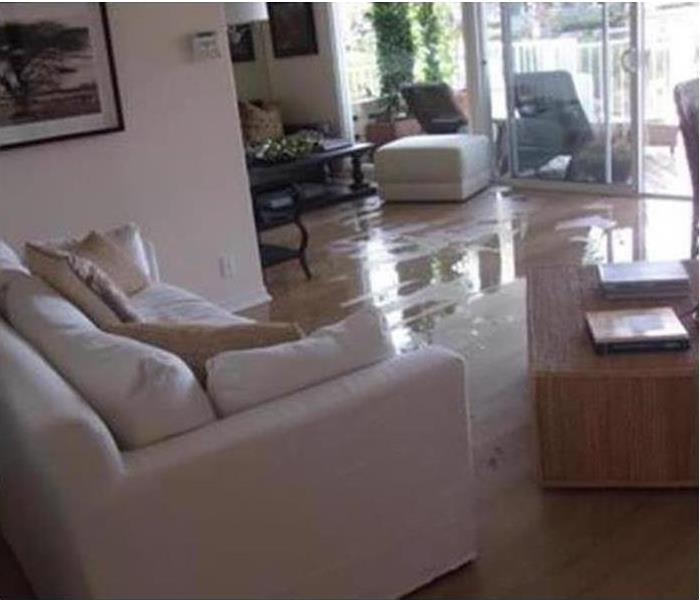 Flooded living room in Mars Hills after a pipe burst.
Flooded living room in Mars Hills after a pipe burst.
Have you ever traveled for an extended period of time and wondered what was going on in your home in Mars Hill, GA? In order to prevent the necessity of water pipe repair, it is important to properly monitor your home while you are away.
Steps To Prevent Water Damage
In order to prevent water damage from a broken pipe while away from your home, here is a list of things you can do to prevent coming home to a house that is flooded.
- Make sure that your heat is on to prevent pipes from freezing while you are away.
- Have someone check on your home while you are gone or utilize a digital home monitoring system that can be viewed using your smart devices.
- Check all the pipes in your water system and heating system before departing to make sure there are no cracks.
- Ensure that your heating system is working correctly, that all necessary repairs have taken place and that the oil tank is filled if your home is heated by oil.
- Look at the connections to your appliances to determine they are secure and there is no chance of a leak occurring.
It is important to take the necessary steps to prevent a leak and do your best to ensure that water pipe repair is not needed when you return home.
What if Water Damage Occurs?
Even with all the preventative measures, there is no guarantee that you will not come home to a broken pipe or some sort of water damage. If something has flooded while you were away, it is important to take the proper steps to dry your home and personal property. Shut off the main water valve if the leak has occurred in a pipe in order to prevent further damage. If the amount of water damage is severe, a professional water mitigation company can help to restore your home and prevent future issues.
Sitting water can be harmful to your home. Prevent it if you can, and don’t be afraid to ask for help with water pipe repair when it is necessary.
Preventative Measures Against Water Damage
12/30/2021 (Permalink)
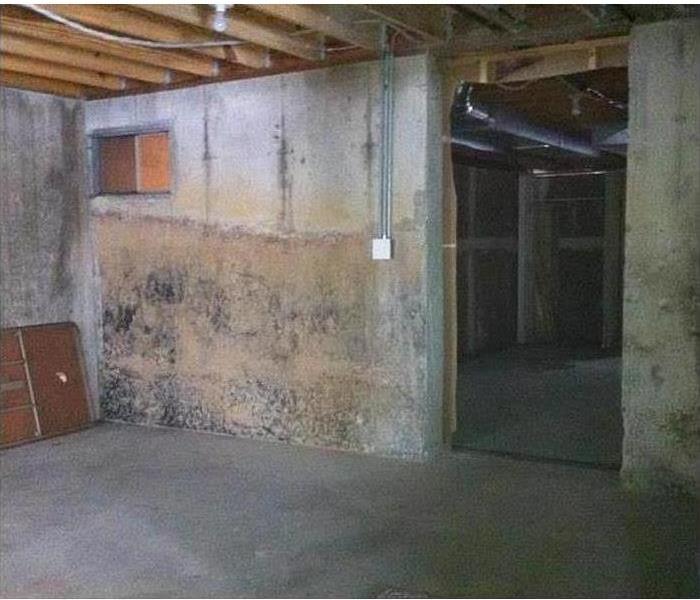 Water damage causes mold to grow in a home in Macland, GA.
Water damage causes mold to grow in a home in Macland, GA.
Water Damage Preventative Measures
When dealing with problematic water in the home, sometimes complacency is the biggest enemy. Many leak or flood scenarios are a result of a process that occurs over a long period of time. Early prevention is key to ensuring that your property in Macland, GA, stays dry.
1. Air Systems
Defective HVAC units are one major cause of leaks in the home. A broken pipe leading to or from the unit can cause visible condensation that accumulates and drips into the insulation below. Cold weather or improper operation can also cause the unit to freeze, resulting in periodic thawing that also creates problematic dripping. Overly-humid air can lead to pockets of moisture buildup over time, exacerbating these issues. Regular inspection of heating and air conditioning systems is necessary to prevent retention of water in the home.
2. Appliances and Related Plumbing
Dishwashers, refrigerators and other appliances need maintenance as well. Corrosion or mechanical wear can cause cracks or fit issues on pipes, gaskets and valves that connect your appliances to your home’s plumbing system. An appropriate pipe cleanup procedure involves both replacement of the broken components and a removal of any lingering water or soaked flooring or drywall surrounding the leak.
3. The Bathroom
Given the volume of water that moves through a typical bathroom, it should be no surprise that leakage can ensue there as well. Toilet drains and shower fixtures should also be inspected frequently to determine that water is only moving through the intended drainage channels. Again, persistent condensation, discoloration or oxidized metal surfaces can be indicative of a problem.
In short, drainage and ventilation keep a home dry. A single point of failure in any of these systems can be enough to cause substantial damage given enough time. Remember, if standing water in the home becomes a severe enough problem, it may be necessary to contact a professional cleanup service.
3 Common Water Issues That Could Affect Your Office
11/29/2021 (Permalink)
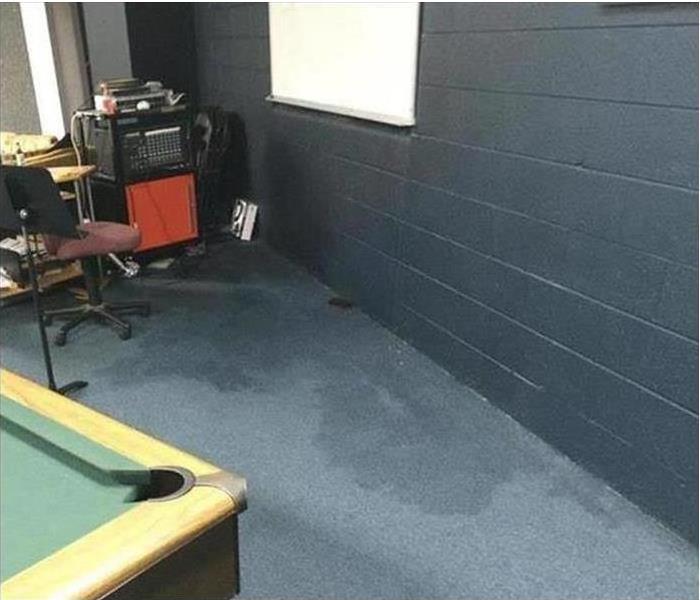 Water seeped in from a crack in the foundation.
Water seeped in from a crack in the foundation.
Three Common Situations to Look Out For
Owning a commercial property in Davis Crossroads, GA comes with various maintenance responsibilities. One of the most important things you can do to keep your building safe is to inspect it regularly for potential water issues. Leaking pipes can become a big problem if they go undetected for too long. Here are three common situations to look out for.
1. Foundation Problems
If your office building settles unevenly, it can cause all sorts of difficulties. A cracked or compromised foundation can make existing plumbing problems worse or cause new complications. What starts as tree roots burrowing into the foundation or sewer lines can turn into a pipe break or structural deterioration that affects the whole building. Have your foundation inspected at least once a year to find hidden damage. Have any noticeable cracks repaired as soon as possible.
2. Pipe Damage
Many things can cause your pipes or sewer lines to leak. Old lines deteriorate over time, and freezing temperatures can lead to burst or leaking pipes. If you smell sewer gas or see puddles in unusual places, it's a good idea to contact a plumber to investigate potential sewer troubles. If your ceiling tiles or walls bulge out or have water spots, you likely have pipe destruction behind them. Water restoration specialists can mitigate the water damage after the pipe is repaired.
3. Fixture Leaks
Sometimes small troubles can turn into disasters. For example, a toilet backup is relatively easy to fix unless it isn't cleaned thoroughly. Then it can cause extensive decay to the flooring beneath it and the ceiling of the lower level. A leak around or under a sink not only wastes water but can weaken the structure holding up the sink, causing the need for more repairs over time.
Leaking pipes and other water malfunctions can cause a lot of damage, but they can also usually be fixed before the problems get out of hand. Frequent inspections and timely repairs can lower your overall maintenance costs.
When There's Water Damage, Mold Is Usually Not Far Behind
11/5/2021 (Permalink)
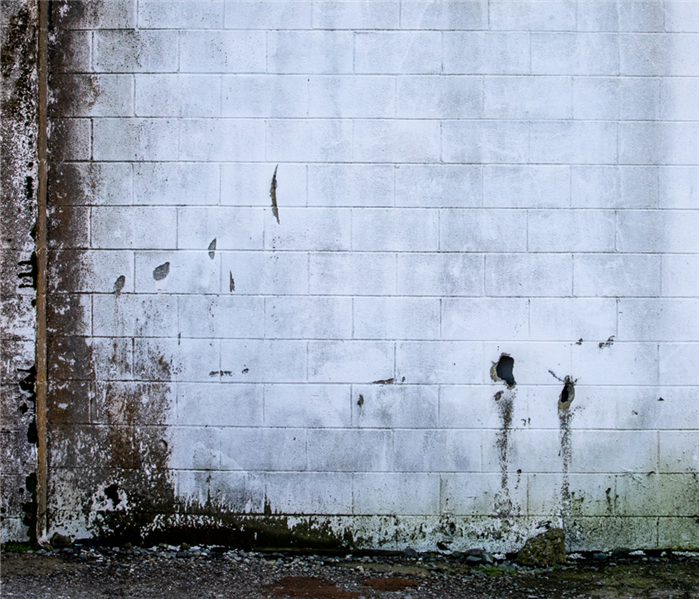 Mold Growing on Wet Wall
Mold Growing on Wet Wall
When there’s water damage, mold is usually not far behind. As water continues to persist, it can often lead to the growth of mold spores. When these spores are allowed to grow without proper restoration services, they can quickly spread over your home or business. It’s important to take care of this problem as soon as possible by calling an experienced water restoration service provider right away if you notice mold developing in your home or business after a flood or other large loss of water.
Can Water Cause Mildew & Mold?
Depending on where your home or office is located, water damage may cause mold. That’s because mold thrives in damp environments with organic materials. It can even grow in basements when you have an excessive amount of water that remains there for extended periods of time. For example, if you live in a flood zone and floodwaters remain in your basement for several days at a time, it could be hard to prevent mildew & mold from forming.
Is Mold Removal a Part of Water Restoration Services?
In many cases, mold removal is an integral part of water restoration services. While mold spores may take several days to reach significant quantities, many water restoration services include biocide and chemical applications to prevent mold proliferation after water damage.
The long-term effects of mold exposure are not well understood and may vary from person to person. Some people are more prone to health effects than others; some people don't seem affected at all. So if you're experiencing water damage, don't hesitate; contact your local professionals for water restoration services as soon as possible. A little prevention goes a long way!
How Fast Does Mold Grow After a Water Leak?
If you ever experience a water leak in your home or business and don’t deal with it immediately (you should know that water damage is one of our specialties), mold could begin to grow almost immediately. It can take as little as 24-48 hours for mold to develop on organic surfaces with continuous moisture.
When is Mold Remediation Required?
If you’ve had water damage to your home or business that wasn’t resolved properly, mold may already be growing inside. If you suspect mold growth in your home or business and see it in multiple areas or across an area greater than 10 square feet, it’s important to act quickly to prevent its spread. Depending on where mold is found, both professional remediation and removal could be required.
If you are in need of professional water damage restoration or mold remediation services, SERVPRO of Northwest Cobb County is Here to Help!
Call us today at (770) 966-1442
3 Common Sources for Water Damage to Businesses
9/20/2021 (Permalink)
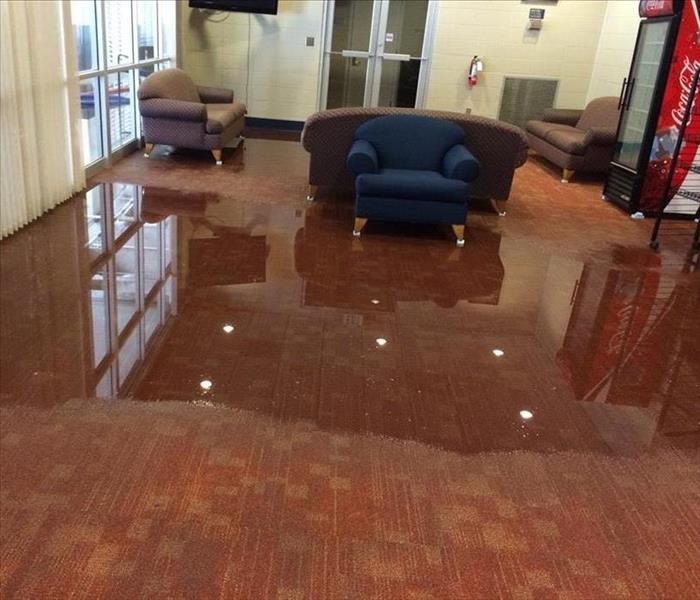 Even if a broken pipe or other situation takes you by surprise, a water damage restoration company can utilize water repair on your property.
Even if a broken pipe or other situation takes you by surprise, a water damage restoration company can utilize water repair on your property.
Water is a necessary utility to business operations, but it can quickly become a nuisance if uncontained from a broken pipe or similar issue. By being vigilant of these three common situations, you can prevent your Acworth, GA, business from major flooding.
1. Sprinkler System Defects
Sprinkler systems are a helpful layer of protection from fire. Unfortunately, they lead to water damage from deploying to stop a fire or accidentally going off from a defect. The only preventable one of these two is an accidental discharge.
To stop a sprinkler system from unintentionally flooding your business, it is advised to regularly have a sprinkler professional inspect the system. You can catch and treat most problems to save your business from unnecessary water damage.
2. Pipe Problems
A leaky pipe can easily become a broken pipe with enough water flow. It is important to properly care for your pipes. They should be kept clear of blockage and unclogged if you notice they are draining slowly.
As a special consideration for cold weather, pipes are susceptible to bursting if left to freeze. To prevent a burst, the pipes need to be drained before the season and thawed if they do become frozen during the cold months.
3. Sewage Overflow
A sewer or toilet overflow threatens your business with more severe water damage due to the contaminants. The overflow is typically caused by tree roots growing into the sewer line or extensive buildup in the disposal system.
Keeping the drains cleaned by a professional will save you from this messy problem. A sewer backup valve, if your business is not equipped with one, makes sewage only able to go one way and unable to flow back.
Water Damage Can be Stopped Regardless
Even if a broken pipe or other situation takes you by surprise, a professional water damage restoration company can utilize water repair on your property and assets. You should be mindful to stop common water problems from damaging your business, but there is a remedy to anything not prevented.
Why Is Fast Action Important After a Pipe Break?
6/28/2021 (Permalink)
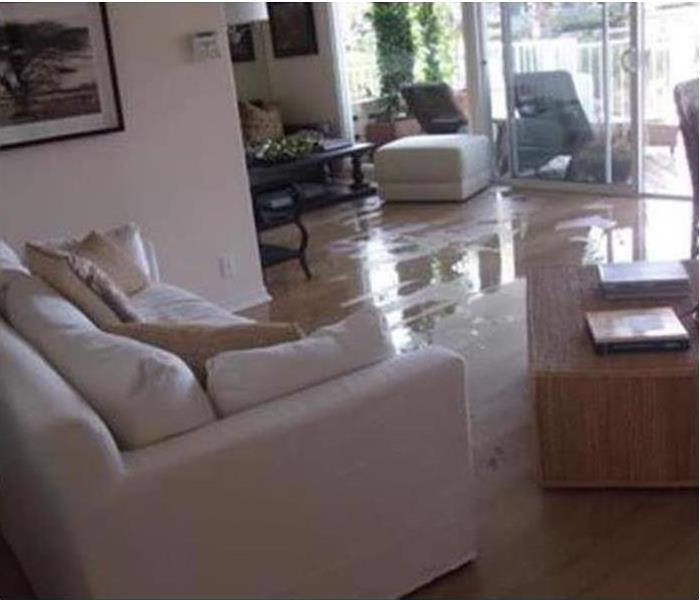 Standing water after a burst pipe causing flooding in a Macland, GA home.
Standing water after a burst pipe causing flooding in a Macland, GA home.
What Actions Should Be Taken In The Event Of A Burst Pipe?
Bursting pipes may be the last thing you want to deal with in your Macland, GA, home. However, if you notice this issue, you need to address it as quickly as you can. Your local water remediation team can help you quickly assess and respond to the damage. Your professional cleanup crew can also help you understand why fast action is important.
• Get to the Source: Calling someone in to inspect water damage as soon as you notice it can help you figure out what caused the problem. Whether it was rainwater, sewage backup or a busted pipe, getting to the source of the problem can help you avoid a repeat. If you simply clean up the standing water without a thought of what caused it, you may have more water in your home the next day or the next time it rains.
• Stop Mold Growth: Bursting pipes often release clean water into your house. However, even clean water can introduce mold growth if it is left unattended for too long. Fast action keeps mold growth at bay because you take care of the excess moisture before the spores can start to grow.
• Save Belongings: As you set out to fix a broken pipe, your goal may be to stop the damage from spreading. Water has a way of flowing to other parts of your home. This travel can damage more building materials, flooring and furnishings than if you had cleaned up the flood right away. Even if the waters aren't on the move, you can save more of your belongings by starting the dry-out process as soon as possible.
Bursting pipes can lead to a lot of damage. If left unattended, you may start to notice mold growth, structural damage and destroyed furnishings. The quicker you are able to act on standing water in your house the easier the repair process will be.
Steps to Water Mitigation
3/9/2021 (Permalink)
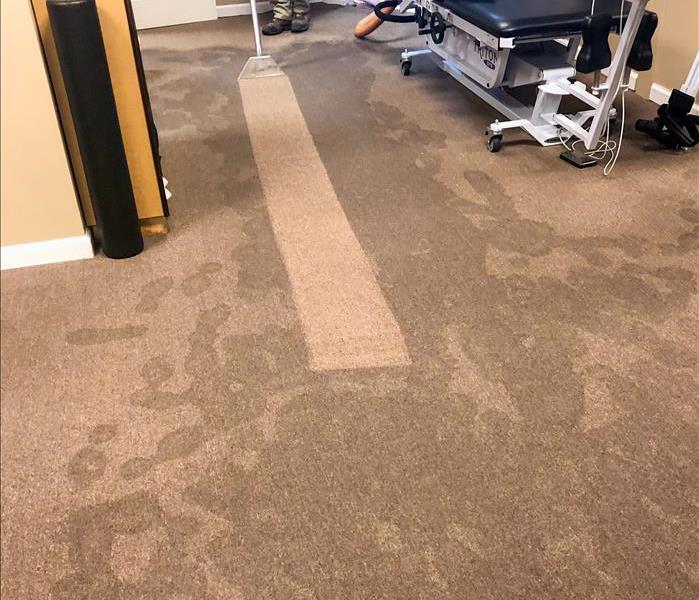 A leaking water heater can cause your home to flood.
A leaking water heater can cause your home to flood.
Steps to Water Mitigation
One common cause for a flooded home that not many people think about is a leaking water heater. Water heaters sometimes contain up to 80 gallons of water, not to mention if the water is leaking from an incoming pipe. This much water can cause a tremendous amount of damage very quickly. Fortunately, water damage mitigation companies in Acworth, GA can help you with this problem.
Inspection
The first thing a remediation or mitigation company will perform is a thorough inspection of the water-damaged area. This includes:
- Looking at the failed water heater
- Looking for broken pipelines
- Turning off water
- Assessing the damage
- Taking pictures for your insurance or warranty company.
The company will make a thorough report of all the damages they can see and some that might develop.
Removal and Drying
The next thing they will begin is removing damaged items, including your leaking water heater, drywall and flooring. Then they will begin the drying process. This process is done with fans, heaters, pumps, dehumidifiers, air scrubbers and other drying devices. They might also use protective measures such as capping off pipes that might be leaking or repairing cracks.
Decide What's Next
After the removal and drying phase, it is up to you and the company you hire to decide what is next. Obviously, replacing your broken water heater will be on the list, but you will also need to replace drywall, flooring and anything else that was damaged. This can involve a considerable amount of work.
Another issue is mold and mildew remediation. Anytime water is involved, this is a possibility. Most remediation and mitigation companies are well versed in taking care of these problems.
Unfortunately, a leaking water heater can cause extensive damage to your home and property. This is something that should be fixed as quickly as possible before it can cause more damage. Mitigation and remediation companies can help provide you with a comprehensive plan to make things right.
3 Kinds of IIRC Certified Specialists Trained To Handle Drying in Water Damage Remediation
2/11/2021 (Permalink)
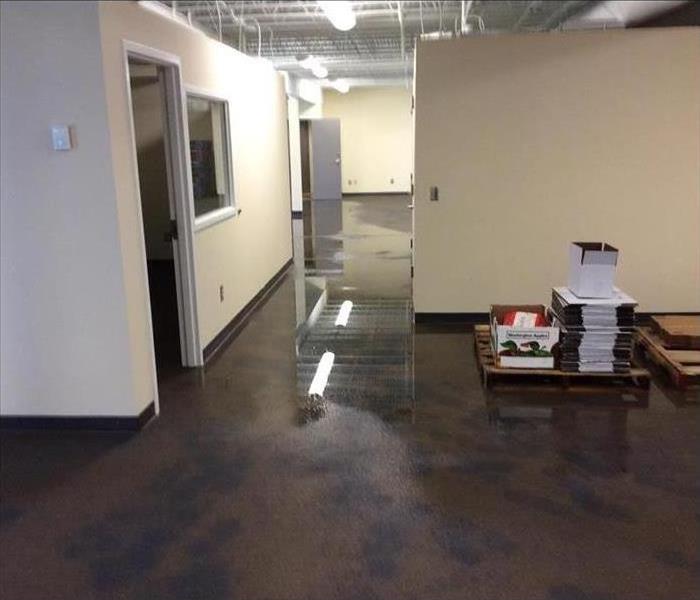 Contact a professional remediation and restoration company in Acworth, GA
Contact a professional remediation and restoration company in Acworth, GA
3 Kinds of IIRC Certified Specialists Trained To Handle Drying in Water Damage Remediation
Water damage may arise from many sources. It is the product of weather conditions, home malfunctions and random acts of nature. Whether they are the result of a broken pipe, rain from a leaking roof or some other cause, large influxes of water may lead to destruction and irreparable harm. It is important to contact professionals like a remediation and restoration company in Acworth, GA, to prevent or lessen commercial property damage and carry out water clean up in flooding cases. The Institute of Inspection, Cleaning and Restoration Certification, or IICRC, trains several kinds of experts to handle different aspects of such situations, including drying.
1. Commercial Drying Specialists
Water clean up projects needing the services of commercial drying specialists often involve hazards like heavy equipment, high voltage in confined spaces, electric machinery and dangerous chemicals. While the course they go through to obtain certification does not cover all potential risks, they are encouraged to research them on their own. They must also be familiar with and comply with relevant regulations. They are trained in:
- Damage inspection and determination
- Utilization of technical drying methods for water-impacted structures, furniture, systems and more
- Workflow management
- Process administration
2. Water Damage Restoration Technicians
Usually working in concert with a water damage restoration team, these technicians perform mitigation tasks. They evaluate severity, remove water and try to salvage items like inventory. They also possess an understanding of the different categories of water damage, the extent of harm each can do and how to deal with each.
3. Applied Structural Drying Technicians
Similar to commercial drying specialists, these individuals are trained to make quick, informed decisions. Like them, and like water damage restoration technicians, they work to get rid of moisture.
While all of these have overlapping roles, certified professionals must undergo specially designed coursework for each title. Companies may employ one or more of any of these kinds of experts for water clean up and remediation. The IICRC also offers many other certifications in the cleaning and restoration industry.
How To Minimize the Damage from a Sink Leak
12/28/2020 (Permalink)
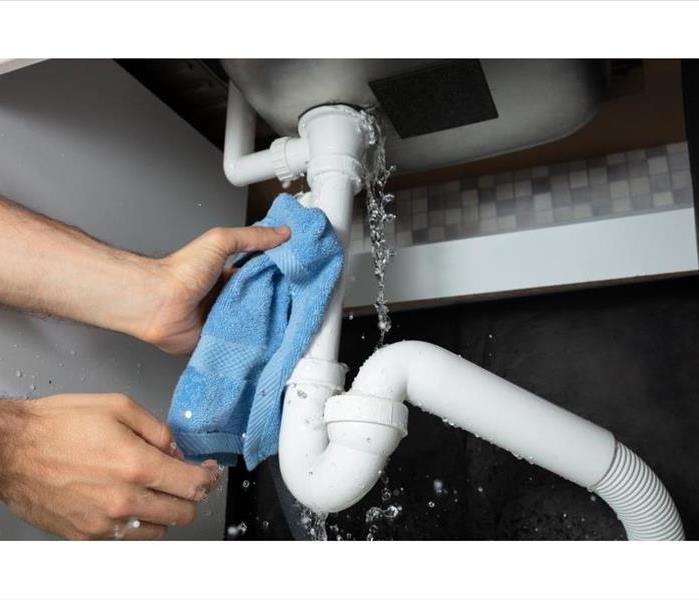 A kitchen sink leak that leads to flooding can cause more damage to your home
A kitchen sink leak that leads to flooding can cause more damage to your home
Unattended Leaks Can Lead To Larger Cases Of Flooding
Have you ever reached under your sink for a new sponge only to discover that there's a puddle of water below the sink pipes? Or maybe you've walked into the kitchen in the morning to make coffee and stepped in a larger puddle of water. No matter the size of the leak, there are steps that you should take to minimize the water damage from your leaking kitchen sink.
1. Turn Off the Water
The first thing that you need to do is turn off the water at the source. Water can't continue to leak if it doesn't have a source. While it may be inconvenient to be without water in the kitchen, you can't conduct cleanup effectively if more water is still leaking.
2. Call Your Insurance Company
Once you've contained the flooding, call your insurance company to report that you have water in the home and file a claim. Even if the leak appears to be minor, it's difficult to be sure that the only problem is a visible one. Your insurance company may want you to take pictures of the damage, so be sure to do that before you start cleaning up. They will be able to recommend a repair company in Kennesaw, GA whose services they will cover.
3. Call a Repair Specialist
You want your kitchen repair to be completed as quickly as possible. Hire a water damage restoration company that has a good reputation for being able clean up the visible mess quickly and efficiently, but who will also evaluate the less visible areas to ensure that you don't end up dealing with the long-term effects of mold or structural damage.
A kitchen sink leak that leads to flooding can cause more damage to your home than is immediately visible. Work with SERVPRO of Northwest Cobb County who will help restore your home and make it look “Like it never even happened.”
Will My Insurance Policy Cover Water Damage?
11/23/2020 (Permalink)
 Water damage is one of the most common reasons for home insurance claims
Water damage is one of the most common reasons for home insurance claims
Water damage is one of the most common reasons for home insurance claims. Damage can be sudden, such as from bursting pipes. It can also be gradual, like when water seeps through cracks in the foundation. Not all types of damage are covered by insurance, so homeowners in Acworth, GA, should be aware of what their policy covers.
How Can Water Cause Damage?
Types of water damage that can happen in your home include:
Your coverage depends on what kind of policy you have, the source of the damage and if it is gradual or sudden and accidental.
What Is Gradual Water Damage?
Gradual damage starts slowly and takes place over time. It may happen when deteriorated flashing or loose shingles allow water to enter through the roof, or when plumbing leaks slowly and causes damage to ceilings, walls or floors. Lack of repairs, such as failing to fix a broken pipe, and poor repair jobs can also cause gradual damage.
Because insurance is designed to cover sudden and accidental damage, your policy may not cover damage caused slowly over time.
What Is Resulting Damage?
Resulting damage differs from gradual damage and may be covered by insurance. For example, poorly installed plumbing may leak and cause gradual damage. If the leak results in bursting pipes, the resulting damage to the home may be covered.
How Do I Make a Claim?
If your home has sustained damage from a water source, the first step is to secure your belongings and prevent further damage. Shut off the water and make temporary repairs. When it's safe to do so, take photos. If you think you have a claim, call your insurance company. A claims adjuster can assess the situation and determine coverage for repairs and professional damage restoration expenses.
It's best to know your insurance coverage before a disaster happens. If you find yourself faced with bursting pipes or a roof leak, you won't be left wondering if the damage is covered.
How To Prevent Water Heater Disasters
10/13/2020 (Permalink)
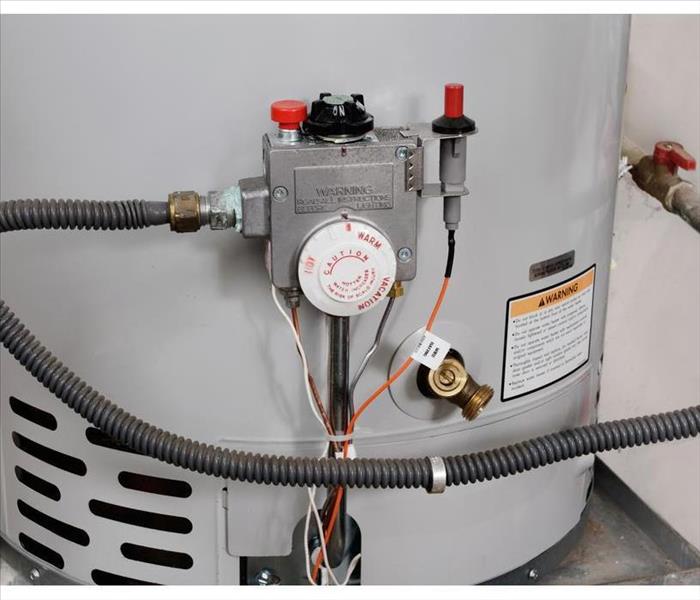 Is your hot water heater in Macland, GA, making noise?
Is your hot water heater in Macland, GA, making noise?
Is your hot water heater in Macland, GA, making noise? If so, this could be a sign of an imminent breakdown. Know what to listen for to head off a watery fiasco.
Heater Warning Sounds
Your device may be on its last leg if you detect:
- Humming
- Ticking or tapping
- Hammering or knocking
- Screeching or screaming
- Cracking, popping or rumbling
Not all sounds are indicators of serious problems, so consult your owner’s manual to diagnose the symptoms you are experiencing and never panic. Remember that a qualified plumber or heater technician can help map out the most appropriate response.
Heater Breakdown Causes
When systems fall apart, a mess requiring the aid of a water damage restoration specialist may arise. Being familiar with the reasons a water heater failure may occur will help in heading off a worst-case scenario.
One primary cause of heater strain is sediment filling the bottom of your tank. Perform a periodic water heater flush to keep this from happening.
High water pressure is another major trigger. If you exceed 80 psi, you may begin to notice water overflowing from the side pipe. Replace your relief valve when this happens.
Your heater may be too small, in which case it’s only a matter of time before overwork causes it to malfunction. Consult an appliance expert beforehand to assure your home is outfitted with one the appropriate size.
Heaters use metal rods to prevent corrosion. Over time, however, they must be replaced. When they are not, rust accumulates and wreaks havoc. Therefore, have them checked once a year.
Heaters typically last between eight and 12 years. File your purchase slip in an accessible spot so you can handily refer to the installation date once concerns surface. A good indicator that a replacement has become necessary is when the pilot light refuses to stay lit.
When your water heater begins showing symptoms of a meltdown, know the cause of the trouble. Then, contact a service professional or purchase a newer model before you suffer flooding.
What To Do With Soaked Electronics
9/9/2020 (Permalink)
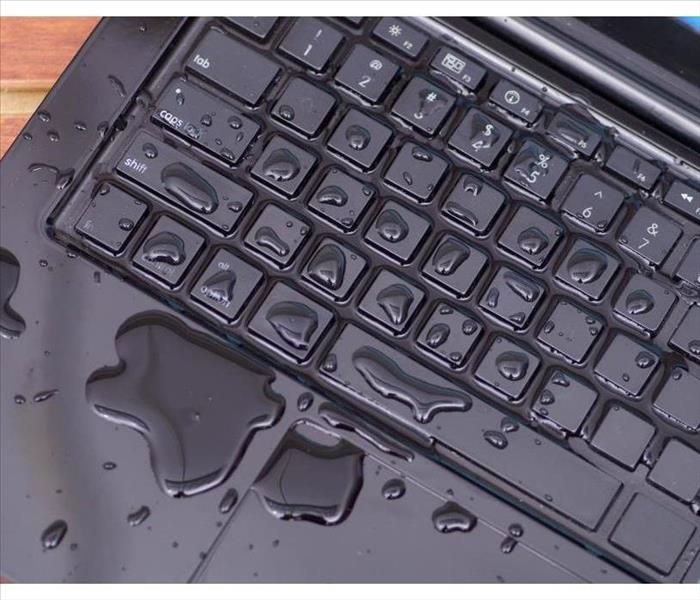 Computer damaged by water
Computer damaged by water
What To Do When You Have Soaked Electronics?
Flooding can cause a lot of damage to your personal home and property. When it comes to water damage, none is quite as heartbreaking as finding flooded electronics and fried circuit boards. Dealing with this damage can be dangerous, so make sure you know what you're doing before you try to salvage the electronics from your home flood in Mars Hill, GA.
1. Assess The Situation: The last thing you want to do is get yourself electrocuted. Remove any wet garments and completely dry your hands before touching active electronics. If you can do so safely, you should also disconnect your home's electricity.
2. Watch Out for Smoke and/or Steam: Even if the device is battery powered, you can still find yourself on the receiving end of a nasty shock. If you go to retrieve your submerged device and find that it's emitting smoke or steam, do not touch it.
3. Turn Your Device Off Immediately: The heat from the device can accelerate water damage in your electronic devices. Once you do retrieve your flooded electronics from the water, you should immediately shut them off to avoid causing more damage.
4. Remove And Dry The Water: If you can, dump any leftover water out of the device. This can be done by gently shaking or turning the device. If you can, disassemble the electronic and lay the individual parts out to dry. Remove the battery first.
5. Do Not Rely On Rice: Using rice to draw water out of submerged electronics is merely a myth. It may draw the water out, but it cannot remove the contaminants that actually cause the electronic damage.
Floods can wreck absolute havoc on your personal home and property. Dealing with flooded electronics on top of water damage just feels like adding insult to injury as well. If your home has fallen victim to a flood, you should consider contacting flood remediation experts to assist with the damage.
Tips for Preventing Water Damage in a Home
6/15/2020 (Permalink)
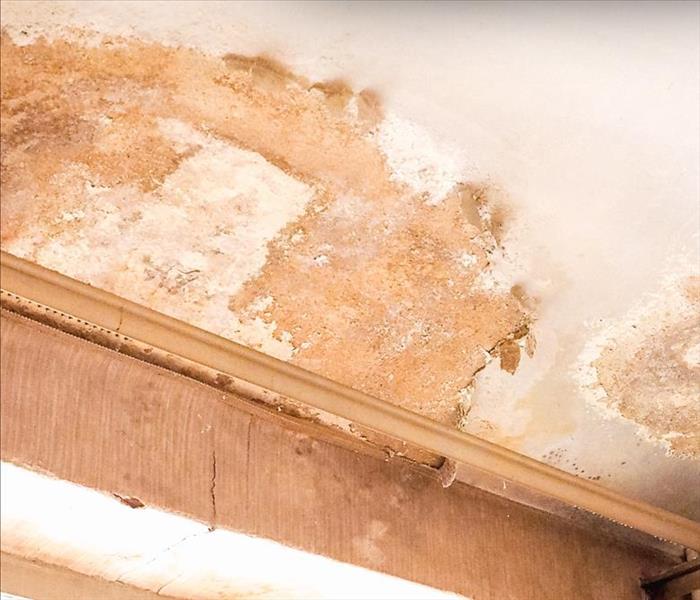 Water damage on ceiling
Water damage on ceiling
Tips for Preventing Water Damage in a Home
It's always better to avoid a problem in the first place than it is to clean up a mess afterward. This universal truth applies to the leaking of water in home situations, where water damage could result in problems small, medium, and large. Fortunately, a number of things can be done to avoid most instances of water running rampant in a home, including the following:
- Stay alert for water leaks
- Pay attention to plumbing fixtures
- Hire licensed and insured plumbing contractors
- Allow contractors to install new appliances
- Maintain devices such as water heaters
Old houses require even more diligence, but even newer homes have issues. The plumbing network in any home has dozens if not hundreds of connections that could spring a leak at any time.
More Things To Consider
Sometimes water in home plumbing problems are obvious, such as a broken pipe, while other times they can be subtle. For example, a small leak behind a wall could go unnoticed for days or weeks. Signs of leaking water might be as minor as a discolored marking on the wall or a faint odor. It also pays to occasionally inspect the basement or attic for signs of water damage such as dampness or the patches of mold growing on wood, insulation or tiling. Areas such as the base of a toilet, the exterior of a shower, the bottom of a dishwasher or washing machine should be routinely inspected for signs of leaks.
Additional Steps To Take
To prevent water in home from causing extensive damage, the services of a qualified water mitigation franchise in Mars Hill, GA, can provide many benefits. A professional team of technicians can arrive on the scene only hours after a call and begin a pipe cleanup or other actions. They can quickly assess the situation and get to work removing water, stopping the source of the water leak, and drying out the impacted areas. The goal is to restore a home to is original condition as efficiently as possible.
3 Ways Water Damage Can Cost Your Business Money
5/14/2020 (Permalink)
3 Ways Water Damage Can Cost Your Business Money
Water damage can affect your Davis Crossroads, GA, business in a variety of ways. While this term might bring to mind a large amount of flooding or an overflowing toilet, even smaller issues can have a large impact. Whether you are dealing with significant damage or just a leak, you could end up losing money in the following ways.
1. Higher Water Bills
A water leak, particularly if it is on the smaller side, might not seem like a big deal. You might even push it to the back of your mind to make room for more urgent matters. However, this is not the best solution to this problem. If the leak is ongoing, you could be losing a much larger amount of water than you think. This can result in higher water bills that can cost your business thousands of dollars. Have leaks repaired quickly to prevent this.
2. Building Repairs
Along with higher water costs, you could also be looking at a repair bill. If you ignore a water leak that ends up causing significant damage to your building, you may be unable to file an insurance claim to cover the costs. A leak can indicate damaged pipes that could break and cause flooding. It can also cause mold to grow and spread through the building.
3. Lost Work Hours
If there is a pipe break in the building, you might be unable to work while repairs are being done. Depending on the severity of the damage, the process can be lengthy. Over this time, you could lose money in the form of sales and profits. You might also lose valuable work time. You can reduce the likelihood of this by performing inspections and maintaining your building regularly.
Even if it is something as small as a water leak, it is a good idea to hire a water damage remediation company to perform repairs to your building when needed. Catching these problems before they become larger will keep your business from suffering more severe losses.
How To Flush Your Water Heater Properly
2/20/2020 (Permalink)
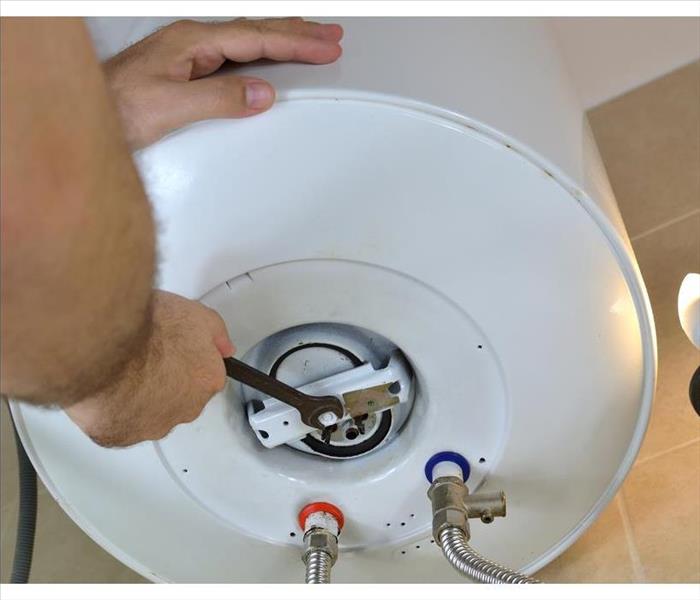 Flush your water heater
Flush your water heater
You may not spend much time thinking about your water heater. When there's a problem, however, you realize how much you depend on it. Wise homeowners know some important maintenance tips to prolong the life of this appliance. A simple flush of this unit can help it work more efficiently and avoid troubling issues such as leaks.
Why Do a Flush?
If you ignore your water heater, you're not alone. Many Red Rock, GA, residents don't know how to flush the unit or simply put it off. This task is critical, however, to the appliance's health. Here's why:
- A flush will remove the sediment deposits from the bottom of the heater.
- The sediment can cause the unit to rust, suffer or damage or fail entirely.
A flush will keep the unit running correctly longer.
Drain the Water
When you're ready to start the water heater flush, turn off the gas to the appliance and open the pressure relief valve. Next, attach a garden hose to the drain valve and open the drain. Make sure you have a large bucket at the other end of the hose. Or, you can direct into a drain in the ground. You should drain the tank until the water is clear. Some heaters may have excessive sediment, so you may have to drain it entirely.
Clean the Tank
Once you have drained the water, flush it with more water. You can do this by opening the cold water spigot leading to the hot water tank. Do this for a few minutes, and you should see clear water. Then, close the drainage valve and open the pressure valve. Remove the hose, and you should have a more efficient heater. After 20 to 30 minutes, the water should start to heat up, and you can resume cooking and bathing comfortably.
Before you have to call a flood cleanup company to rescue you from water damage, flush your water heater. This task can save you a lot of grief down the road.






 24/7 Emergency Service
24/7 Emergency Service













